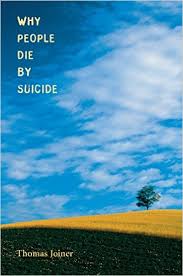 The end of the alphabet is always tough. I could only find one book starting with a “Y” that I’d actually read, and it didn’t affect me in any way.
The end of the alphabet is always tough. I could only find one book starting with a “Y” that I’d actually read, and it didn’t affect me in any way.
This book was one of the many on my “W” list, and when it occurred to me that I could get creative and use it, I was thrilled. This is a book that I feel very passionately that more people should read.
Why People Die by Suicide, by Thomas Joiner, is a book that was recommended to me when I started my job as a crisis therapist. It opened my eyes to so many of the reasons that people attempt suicide.
There are a lot of myths about suicide. We saw that after the death of Robin Williams. People had opinions. Many people expressed that he was selfish or cowardly. It’s easier to believe that, I suppose.
The truth is that when people die by suicide, they often feel that they’re doing a good thing for their friends and family. They honestly feel that others will be better off without them.
Suicide touches the lives of many people, and I think it’s important to talk about it, de-stigmatize it. Talking about it gives us all power. Plus, as I learned while working crisis, you never know when talking to someone frankly about what they’re dealing with can help them to make a less permanent decision.
Suicide is a permanent reaction to a temporary problem.
This is an accessible book for anyone who’s interested in learning more about this topic. The clinical psychologist who wrote it started asking the question after someone in his family died from suicide. The information is tied into research, but there are also anecdotes and
This book helped me gain a better understanding of this topic, but it also helped me be more empathetic. It’s hard for most people to understand what goes through the mind of someone who chooses to die, which is what makes books like this one so important.
Understanding, love, compassion are all things the world could use a little more of.
Sounds like quite the thought-provoking read.
I think those left behind when a loved one commits suicide carry a lot of guilt, wondering if they could have done something different, etc. My daughter tried to commit suicide when she was 18 years ago by taking a lot of medicine. She didn’t succeed but after 4 years of living with her depression and her threats of suicide and being always diligent and vigilant about watching her, I grew weary, especially considering when she actually did try to do so, I thought she was at a “safe time” otherwise I wouldn’t have left her alone. I knew then I could no longer keep her safe unless I watched her 24/7 and sadly had to say she couldn’t come back home to live afterwards, which I know sounds terribly cruel but by doing so, she finally got the help I fought so hard to get for her when she became basically a ward of the state. This book could be interesting.
betty
http://viewsfrombenches.blogspot.com/
It sounds like you did your best to support her. Caregivers need to take care of themselves too.
My husband’s uncle committed suicide. He had been given a serious health diagnosis and had a son who was developmentally disabled. I truly thought he was sparing his wife having to care for him and his son both while his health worsened – but…it’s still a painful topic for the entire family, even now, years later.
That’s such a tragedy, but I’m glad you were able to be understanding. It leaves a scar though.